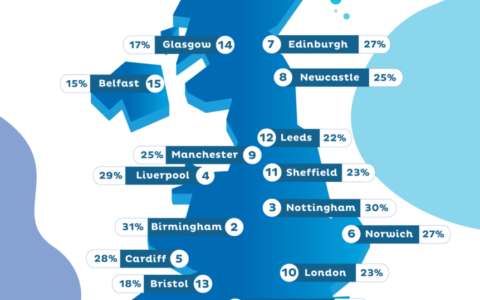
How to get out of debt
Being in debt can be really stressful, especially if you feel like you can’t keep on top of it. Here at Moneyboat, we appreciate how crippling debt can be and how worried you might become when you can’t pay your debts.
Borrowing is a natural part of life and can be essential or even beneficial in some circumstances. However, debt can soon mount up and become unmanageable. Debt charity Stepchange has reported being contacted by a record number of people looking for support with debt. The charity explains that it takes very little to tip people over the edge financially, stating:
‘Life changes, such as losing your job or having your hours cut, splitting up with a partner, falling ill, or becoming a carer are common. Yet, for too many people, the end result can be severe financial difficulty.’
Some level of debt can be fine - until something small changes in your life and you can no longer afford to service the debts you have accumulated.
How to get out of debt fast
If your debt has been sent to a debt collection agency, your fear and anxiety about the money you owe may increase. Some borrowers have even reported receiving letters from their payday loan providers threatening jail, for example. Although there’s no denying that spiralling debt is a serious problem, we’re here to set your mind at rest. Here are some of the best ways to get out of debt, fast.
Breathing space
If you need time to get debt advice and find a debt solution, you may want to consider applying for breathing space.
Breathing space will stop most types of enforcement and also stop most creditors from applying interest and charges for 60 days.
To find out more, check out the Gov.uk site on options for dealing with your debts.
How to get out of debt in seven steps
1. Assess your debt and prioritise
The very first step is to come to terms with your debt and decide which debts should be your priority. A simple way to do this is to write each debt down, not forgetting to record the interest rate as well. As well as adding it all up (so you know where you stand), you need to establish which debts you need to pay off first. The total numbers can look scary at first, but a lot of companies will accept payment plans so you can pay it back in manageable instalments.
If you have any of the following, these are classed as high-priority debts and should be treated as such:
Unpaid council tax bills
Unpaid utility bills
Child maintenance in arrears
Mortgage or other homeowner-secured loans
Rent
Income tax and national insurance
These types of debts, if left unpaid, could have serious repercussions on your life. You could lose your home or have your utilities cut off. You could face court action or have CCJs against you.
Lower priority debts are, largely, unsecured household debts, such as:
Overdrafts
Credit cards
Personal loans
Store cards
2. Speak to your creditors/lenders
Whether you have priority debts or household credit, the first thing you should be doing is contacting the creditor and being honest about the fact that you are struggling to pay what is owed. They will often be open to creating solutions that can work for both parties, usually known as a debt management plan (DMP).
After all, creditors and lenders would ultimately prefer to get the payment from you directly without involving third-party debt collectors, or courts, for that matter.
3. Seek support
As well as contacting your lenders and creditors, it’s also time to seek some extra support for yourself, as the debtor. There are some fantastic debt charities out there that offer free advice to hundreds of thousands of people wanting guidance on how to get out of debt.
Not only will they provide you with information on your rights and immediate options, but they can also offer valuable insight into how others cleared their debts, as well as refer you to organisations that may be able to help you further.
Here’s a list of some organisations that can help:
4. Reduce the cost of your debt by moving it around
This is perhaps the first practical step you can take towards actively getting out of debt. Focus first on your most expensive debt i.e. the debt that charges the highest interest rate.
If it’s a credit card, you may be able to transfer the balance onto a card with an interest-free balance transfer period, although it’s then important to pay off the balance within that timeframe to avoid being moved onto a much higher interest rate at the end of the period.
Debt consolidation loans can be a decent option for those with reasonably healthy credit scores, as they can help you repay expensive debt before focusing on clearing the rest of your debt through one loan, as opposed to several, which can be confusing. They can also allow you to spread the cost of your debt further, reducing your monthly repayments.
Just remember that debt consolidation can lead to you paying back more in interest over the entire loan term.
5. Try to cut back on your outgoings
Whether it’s on packaged bank accounts we don’t need or expensive insurance or utility bills, most of us could cut back on our frequent spending with just a tiny bit of effort.
Useful switching services, such as Look After My Bills have popped up in recent years, helping consumers to find the best deals on their utilities, for example.
Using comparison sites to shop around for the best deals on insurance coverage can also help save you hundreds of pounds each year, which you can use to pay down your debt.
Remortgaging can be another quick and relatively painless way of considerably reducing your monthly outgoings. Although remortgaging may not be the right option if you are still in your initial fixed-rate period, or if your home’s value has fallen, for example. Also, check for early repayment penalties.
Budgeting apps are also a fantastic new way to keep on top of your finances. The Open Banking laws, which allow third parties access to your bank accounts, mean we are all able to have greater visibility over our income and outgoings. This means that making a budget and sticking to it has never been easier. Our guide on the best budgeting apps might help you pick the right one for you.
Make a budget to assess your spending and find out where your money is going each month. Make sure you include all your spending, right down to the milk and bread you buy from the corner shop, and all your debt repayments and interest payments are included. If your outgoings are more than your income, you are heading for a debt spiral and it’s time to make a budget. This includes things like looking at transferring credit card balances but also means cutting back on non-essential spending like TV subscriptions and eating out and finding cheaper alternatives for major costs like childcare and food. Seeing the savings these changes can make in black and white on your app or in your spreadsheet will help focus your efforts.
A great way to budget, in a practical sense, is to set up several different accounts for all your major outgoings. One can be for household bills, another for debt repayments, another for holidays, for example. Once you’ve allocated the required money to each of these pots at the beginning of the month, what you have left in your current account will be for you to spend. Our guide on how to build a budget has lots of helpful information you can also use.
6. Increase your income
We know this isn’t always easy. Although employment numbers are healthy, available work is often unpredictable or of poor quality or pay. Taking on extra work is an obvious way to help clear your debts, but there are also other ways to find extra cash.
Selling items of clothing, equipment and other unwanted items can generate enough cash to help clear smaller, high-interest debt such as payday loans. Selling used clothes and homeware, or even books and toys, is big business now. Consumers are increasingly open to buying second-hand and vintage for their money-saving and environmental benefits.
7. Consider alternative payment arrangements
If you’ve tried all the above steps and your debts are still looming over you, it may be time to consider more drastic action. Let’s take a look at your options:
Check if you can claim grants or benefits
If you are unemployed or have a limited income as well as debt problems, you may be owed benefits, which can help to ease your financial situation. The gov.uk benefits site is a good place to start the process of checking your entitlement.
Consider an Individual Voluntary Arrangement
Government-backed individual voluntary arrangements (IVAs) can sometimes be used to help you get out of debt. They are arrangements made between you and your creditor, with the help of a third-party insolvency practitioner. Our guide on IVAs has more information if this is an option you’re considering.
Consider a Debt Relief Order (DRO)
DROs are usually only an option for those with smaller debts, under £20,000, and who don’t own a home. The process of applying for a DRO involves making your application through the Insolvency Service and paying a £90 fee. You won’t have to appear in court to apply for a DRO and if successful, your debts could be written off after 12 months.
The clear downside to this type of solution is that a DRO will appear as a major blot on your credit record, and you are likely to have problems getting credit, including mortgages, for years after.
Consider bankruptcy
As a last resort, if you really can’t see any way out of your debt hole, you can consider applying for bankruptcy. To do so you will have to forego any savings, including pension savings and may even have to close any businesses you run or sell your home and belongings. It will also show up on your credit record for several years, making it extremely difficult to secure credit, such as a mortgage, for a significant period.
When looking at how to get out of debt, the main thing to remember is that you are not the only one struggling to make ends meet. Millions of people in the UK are just about keeping their heads above the water. If you feel yourself slipping under, remember there is plenty of help and support available.
How to get out of debt with no money and bad credit
If you are in a situation where you don’t have enough money to begin paying back your debts, you might be feeling very anxious and panicked. It’s okay – there are lots of different organisations you can reach out to that can try to help.
If you are concerned about your debts and your ability to repay your payday loan, it’s also important to be open and honest with your lender. They will often be able to help you repay the loan by adjusting the repayment date, which can sometimes help, although this also often leads to larger interest charges.
Getting help for debt problems
Whatever your debt situation, you are not alone and there are several organisations out there that can help and advise you free of charge, such as:
You can also check out our guide to avoiding payday loan scams to help you stay on track when taking out a payday loan.
When it comes to debt, you don’t need to suffer in silence or live in fear. Regulators are there to protect consumers - even those who borrow more than they can afford to repay. Help is at hand, provided you are open, honest, and willing to commit to getting out of your financial hole.
Simple
Apply for a loan hassle-free with an easy application process.
Direct
Get the money you need sent directly to your bank.
Fast
Funding can be released to our approved customers within 15 minutes.*
Reliable
Free application process with transparent borrowing charges.
Representative Example
Based on the last working day of each month
Interest rate 255.5% pa (fixed) Representative 939.5% APR
Compare payday loans.
Warning: Late repayments can cause you serious money problems. For help, go to www.moneyhelper.org.uk.
*Our guide to financial promotions: https://www.moneyboat.co.uk/financial-promotions-info/
Blog Disclaimer
We do all we can to bring you interesting, practical and valuable information. However, please understand the following:
- Moneyboat.co.uk are in no way connected or affiliated with the application or affiliate links mentioned in this or any article. We do not receive any commission and are not responsible for any charges that may result from any free trials or paid subscriptions.
- Moneyboat.co.uk does not provide medical advice It is intended for informational purposes only. It is not a substitute for professional medical advice, diagnosis or treatment. Never ignore professional medical advice in seeking treatment because of something you have read on the site. If you think you may have a medical emergency, seek medical advice immediately or dial 999.
- Information and data on this blog are for information purposes only. While we work hard to ensure it is accurate, we cannot accept responsibility for the accuracy, completeness, suitability or validity of any information provided on the blog. We will not be liable for any errors, omissions, losses, injuries or damages arising from its display or use. All information is provided with no warranties and confers no rights.
If you feel that any of the information published on our blog is not accurate, please notify us via email at thecrew@moneyboat.co.uk.
Representative Example: Borrow £400 for 4 months, 4 monthly repayments of £149.37. Total repayment £597.48, interest rate p.a. (fixed) 255.5%. Representative APR 939.5%.Compare Moneyboat loans.
Warning: Late repayments can cause you serious money problems. For help, go to www.moneyhelper.org.uk.







